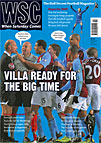 Carlos Queiroz's move home from Manchester United has not gone well. Phil Town reports on a national team suddenly in crisis
Carlos Queiroz's move home from Manchester United has not gone well. Phil Town reports on a national team suddenly in crisis
Despite a series of nearly-got-theres during five years as Portugal coach, by the summer of 2008 Luiz Felipe Scolari had overstayed his welcome and wanted out to lusher pastures. Perhaps seduced by his two successive World Cup wins at Under-20 level (1989 and ’91) and by his association with Manchester United’s successes in recent years, but apparently ignoring his indifferent previous spell as national coach (ten wins from 23 games between 1991 and ’93), the Portuguese Football Federation (FPF) put their faith in the Mozambique-born Carlos Queiroz, at the time a popular choice.
It has taken a matter of months for the initial optimism to crumble into bleak scepticism. A meaningless 5-0 hammering of the Faroe Islands in Queiroz’s first game, a friendly, was followed by a similar exercise against World Cup group one whipping boys Malta (4-0). In the next game, Portugal collapsed in the last five minutes to lose 3‑2 at home to Denmark. A commendable 0‑0 draw in Sweden was achieved, but then came two disastrous results.
Portugal were tenth in the FIFA rankings when they received Albania (98th) on an October evening in Braga. A Faroe Islands/Malta-style goleada was surely on the cards, but no. A limited but organised Albania side, down to ten men for 50 minutes of the game, were more than a match for a disjointed, individualistic Portugal and the game finished goalless (“Not zero-zero, less than zero”, complained sports daily A Bola).
Eight minutes from the end, FPF president Gilberto Madaíl was seen to leave his seat “for physiological reasons… and others”. Cristiano Ronaldo, who had tried but failed throughout to settle the game single-handed, got stroppy with an understandably impatient crowd. Neither he, as captain, nor the coach turned up for the post-match instant interview. Queiroz claimed that he had become lost in the lifts of the Estádio Axa after first having words with the players, but it all sounded a bit convenient and smacked not a little of cowardice.
Eventually he told the press: “We’re constructing a team and we’re not going to put that objective in doubt. With patience we’ll get there.” There were two problems with this: firstly, the Portuguese are not very good at patience, and qualification for South Africa is not a long-term project; secondly, against Albania the team looked more like one under demolition. The next game lent weight to this idea.
Queiroz considered that the November trip to Brazil would be “a great opportunity to motivate and stimulate the players” and “a great day for football, a great event, with all the significance it holds both culturally and socially”. As a motivational exercise, the 6‑2 drubbing, Portugal’s worst result for 53 years, was straight out of The Office, while the most significant cultural effect that the performance and result had had, according to columnist Leonor Pinhão, writing in A Bola, was to provide Brazilians with more ammunition for making up Irish-style jokes about the Portuguese.
“For a leader, it’s important to know who remains firm when the bridge starts shaking,” Queiroz had said before the game. But a camera rarely lies, and as the goals flew in it continually picked up O Professor on the bench, running his hands through his thinning hair in impotent frustration. The sight begged a very unfavourable comparison between Queiroz and his predecessor, Scolari.
The Brazilian’s brashness had not always been a popular trait but had been effective in instilling discipline and urgency in the players of the newly named Clube Portugal. Despite being an outsider, he had also managed to get the whole country behind the team with his projected nationalism. This is not, however, the style of the analytical, softly spoken, low-profile Queiroz. “Those who know me know I’m not one for bombastic statements,” he said after the Faroe Islands game, when asked why he didn’t try to pump up support for the side. “I prefer not to make promises. I want to talk less and do more.”
So far he’s certainly done less than Scolari. And as for promises, well, there’s one he has made: “The Selecção will get the points needed for World Cup qualification, in whatever stadium and against whatever opposition.” Queiroz has three months’ respite from criticism before that promise is put to the test against Sweden. But few here now believe it’s a promise that can be kept by a team who have rapidly gone from being universally feared to being perceived as a bit of a soft touch.
From WSC 264 February 2009